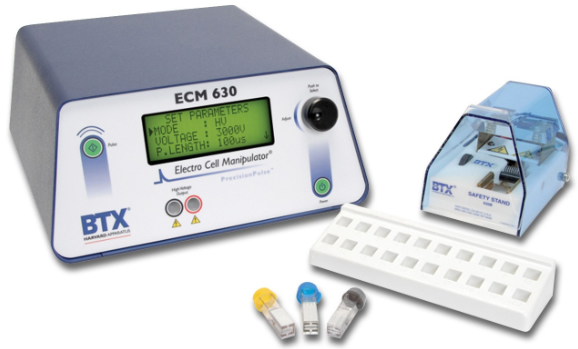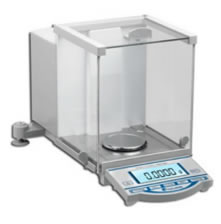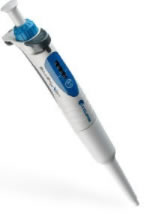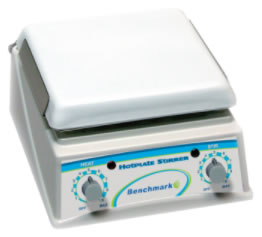450001 ECM 630 Exponential Decay Wave Electroporation System BTX
The ECM 630 is an exponential decay wave electroporation generator providing a broad range of voltage and time constants for full flexibility in varying transfection applications.
$11,539.00
The ECM 630 is an exponential decay wave electroporation generator providing a broad range of voltage and time constants for full flexibility in varying transfection applications. The ability to select the resistance and capacitance values, and adjust the range of voltages is the key to achieving the optimal time constants and field strengths needed for efficient transformation of prokaryote and eukaryote transfection. The ECM 630 can perform the widest range of electroporation applications among commercially available electroporation generators. Legacy ECM 630 systems are available while supplies last as we transition to new ECM 630 instruments.
Flexibility is important, so BTX has designed a plug and play system for our ECM 630 system to transition between standard cuvettes and to 25/96-well plates using High Throughput Plate Handlers.
The ECM 630 is intended For Research Use Only. Not for use in diagnostic, pre-clinical, or clinical procedures.
NEW ECM 630 FEATURES
- Large, easy to use color touchscreen interface
- Preset protocols for transforming the most common bacteria, yeast, and microorganisms
- High-Throughput Plate Handler setting for automatic processing of up to 96 samples at a time with an HT-200 Plate Handler
- Create, modify, and store up to 1,000 user defined protocols
- Enhanced Safety Features: Pre-pulse sample resistance check, arc protection, and over-current pulse abort
- Data Management: Experimental data log stores parameters of all pulses delivered and every sample resistance for QC and troubleshooting purposes
- Voltage range of 5 V to 3,000
- Capacitance range of 25 µF to 3,275 µF in 25 µF steps in LV mode; 10, 25, 35, 50, 60, 75, 85 µF in HV mode.
- Resistance range of 25 ohm to 1,575 ohm in 25 ohm steps.
LEGACY ECM 630 FEATURES
- Digital user interface; push button rotary knob to set parameters
- Voltage range of 10 V to 2,500 V
- Capacitance Range of 25 µF to 3,275 µF in 25 µF steps.
- Resistance range of 25 ohm to 1,525 ohm in 25 ohm steps. The additional resistor selection “None” allows researchers to reproduce protocols from competitive systems
APPLICATIONS
- Transformation of bacteria and yeast
- Transfection of mammalian cells
- Transfection of plant tissue and plant protoplasts
- High throughput 25- and 96-well electroporation
HIGH THROUGHPUT (HT) ELECTROPORATION
The High Throughput (HT) 96- and 25-well systems offer multi-well electroporation technology for processing multiple samples in seconds. Using the HT multi-well plates instead of traditional cuvettes, the researcher can transition from a single cuvette to either a 96-well or 25-well electroporation plate by using a plate handler. This increases yields and the number of experiment runs in a single day. Experiments take seconds to run, allowing for quick and efficient optimization of the electrical and biological parameters. Once optimized, samples are rapidly processed increasing yields and saving valuable time and money.
The key to the HT System is the combination of the ECM 630 Generator with the Plate Handler and multi-well plates. The Plate Handler holds the plates and delivers the pulse(s) to the wells using parameters set in the ECM 630 generator. The HT-100 Plate Handler provides manual track switching (45-0412, 45- 0422). New ECM 630 instruments are also compatible with HT-200 plate handlers for automatic processing of up to 96 samples at a time.
MONITORING OPTION
Addition of the ENHANCER 3000 allows the researcher to monitor and track key electrical parameters used in electroporation applications. The electrical pulse data is captured as both a graphic display of the wave form and electrical output values following each experiment.
| SPECIFICATIONS FOR THE ECM 630 GENERATOR | |
| Display Type | 7 inch color touchscreen interface |
| Power Source Voltage | 100 to 240 VAC, 50 to 60 Hz, CAT II Power 350 W (Pulsing), 35 W (Idle) |
| Fusing | Type 3AG, 5 A, 250 V 1/4 x 1 1/4 in; Type T (time delay) |
| Environmental Characteristics | |
| Intended Use | Indoor use only |
| Operating Temperature | 4° C to 40° C |
| Cooling | Convection through metal case |
| Relative Humidity | 20% to 80% RH, non-condensing |
| Mechanical Characteristics | |
| Footprint | 12.75″ x 11.25″ x 8.5″ (W x D x H) |
| Weight | 16.0 lb (7.3 kg) |
| Controls | Touchscreen, On/Off power switch |
| STANDARD CAPABILITIES | |
| Operational Status | Internal self test upon start-up |
| Interface | 7 inch color touchscreen user interface |
| Programmability | Storage over 1000 Protocols |
| Data Management | Experimental Log of Pulse Parameters and Sample Resistance |
| Input | 100 V to 240 VAC Universal |
| Charge Time | LV < 7 s, HV < 4 s |
| Arc Control | Yes |
| Voltage Range | LV Mode 5 – 500 V in 1 V steps; HV Mode 505 – 3000 V in 5 V steps |
| Capacitance Range | LV Mode 25 µF to 3,275 µF in 25 µF steps; HV Mode 10, 25, 35, 50, 60, 75, 85 µF |
| Resistance Range | LV Mode 25 ohm – 1,575 ohm in 25 ohm steps; HV Mode 50 ohm – 1,575 ohm in 25 ohm steps |
| SPECIFICATIONS FOR THE LEGACY ECM 630 GENERATOR | |
| Display Type | 20-character by 4-line liquid crystal display. LED backlit |
| Power Source Voltage | 100 to 240 VAC, 50 to 60 Hz, CAT II Power 500 W (Pulsed), 50 W (Idle) |
| Fusing | 2.5 A, T rating 250 V |
| Environmental Characteristics | |
| Intended Use | Indoor use only |
| Operating Temperature | 10° C to + 40° C |
| Cooling | Convection through metal case |
| Relative Humidity | 60% |
| Altitude | 2,000 m (operating) |
| Mechanical Characteristics | |
| Footprint | 12.5″ x 12.25″ x 5.5″ (W x D x H) |
| Weight | 10.0 lb (4.5 kg) |
| Controls | Single rotary knob with push button toggle to set parameters, On/Off power and Start switches |
| STANDARD CAPABILITIES | |
| Operational Status | Internal self test upon start-up |
| Interface | Digital User Interface |
| Input | 110 V / 220 V Universal |
| Charge Time | 5 sec maximum |
| Arc Control | Arc Quenching™ |
| Voltage Range | 10 – 500 V LV Mode / 1 V resolution 50 – 2500 V HV Mode/ 5 V resolution |
| Capacitance Range | 1 µF, 25 µF to 3,275 µF LV Mode 25 µF, 50 µF HV Mode |
| Resistance Range | 25 ohm – 1,575 ohm/ 25 ohm resolution HV & LV Modes; “None” setting to simulate alternative systems lacking resistance control LV Mode |
| Weight | 16 lbs |
|---|---|
| Dimensions | 11.25 × 12.75 × 8.5 in |
| Product | 450001(Legacy ECM 630 Electroporation System Complete, for Cuvettes) |




